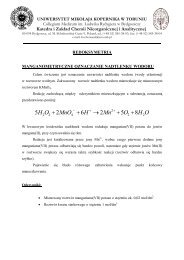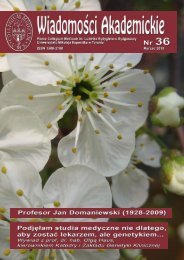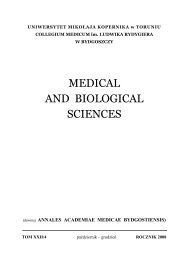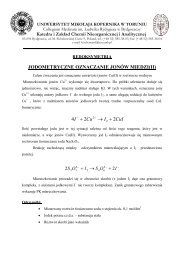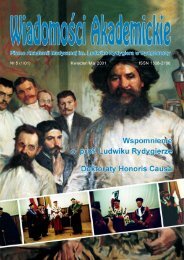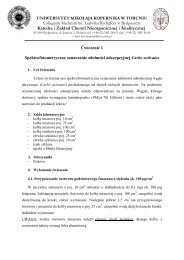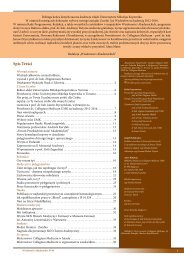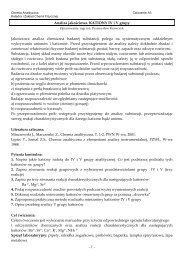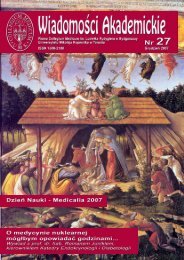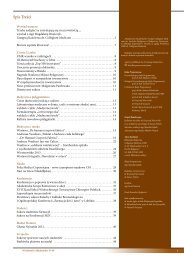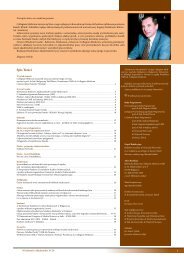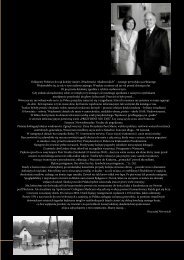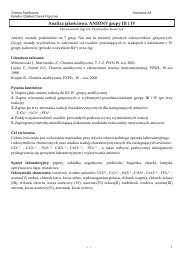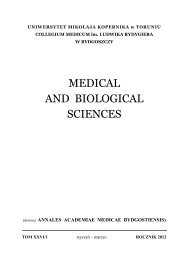Medical and Biological Sciences XXII/1 - Collegium Medicum ...
Medical and Biological Sciences XXII/1 - Collegium Medicum ...
Medical and Biological Sciences XXII/1 - Collegium Medicum ...
- No tags were found...
You also want an ePaper? Increase the reach of your titles
YUMPU automatically turns print PDFs into web optimized ePapers that Google loves.
<strong>Medical</strong> <strong>and</strong> <strong>Biological</strong> <strong>Sciences</strong>, 2008, 22/1, 71-75PRACA ORYGINALNA / ORIGINAL ARTICLEEwa Sygit 1 , Tomasz Kowalkowski 2NADOPIEKUŃCZOŚĆ I ZANIECHANIE– FORMY PRZEMOCY ODCZUWANE PRZEZ OSOBY STARSZEOVERPROTECTION AND NEGLECT – FORMS OF VIOLENCE EXPERIENCEDBY ELDERLY PEOPLE1 Z Katedry i Zakładu Psychologii Klinicznej UMK w Toruniu <strong>Collegium</strong> <strong>Medicum</strong> im. L. Rydygiera w Bydgoszczykierownik: prof. dr hab. Roman Ossowski2 Z Katedry Chemii Środowiska i Bioanalityki UMK w Toruniukierownik: prof. dr hab. Bogusław BuszewskiStreszczenieW s t ę p. Nadopiekuńczość i zaniedbanie to dwie formyniewłaściwego traktowania człowieka, które uważane sąrównież za formy przemocy. Coraz częściej ofiarami takichzachowań są osoby starsze. Z uwagi na swoją słabość fizyczną,samotność, uzależnienie od rodziny - są one na to bardziejnarażone. Takie zachowania często są wynikiem społecznychuprzedzeń w stosunku do osób starszych (ageism).C e l e m b a d a ń było ustalenie odczuwania dwóchform przemocy: nadopiekuńczości i zaniedbania, przez osobystarsze w zależności od takich zmiennych jak: płeć, wykształceniei wiek.M a t e r i a ł i m e t o d a. W badaniu wzięło udział 70osób w przedziale wiekowym 60-85 lat. Metodą pomiarubyły stwierdzenia z kwestionariusza, do których każdyuczestnik badania miał się ustosunkować.W y n i k i wykazały, że nie istnieje statystyczna zależnośćmiędzy wiekiem osób badanych a odczuwaniem dwóchform przemocy. W grupie osób najstarszych (82 lata i powyżej)wyniki były zarówno skrajnie niskie, jak i skrajnie wysokie.Istnieje natomiast zależność między wykształceniemosób badanych a poczuciem odczuwania: nadopiekuńczościi zaniedbania. Im wyższe wykształcenie, tym niższy poziomich odczuwania.W stosunku do zmiennej „płeć”, zaobserwowano trendstatystyczny między tą zmienną a nadopiekuńczością.SummaryI n t r o d u c t i o n. Overprotection <strong>and</strong> neglect are twoforms of inappropriate treatment of a human, which are alsoconsidered to be forms of violence. Elderly people are more<strong>and</strong> more often victims of this kind of behaviour. Takinginto account their physical weakness, loneliness, dependenceon family, they are more vulnerable to violence. This kind ofbehaviour is also often a result of prejudice against olderpeople (ageism).T h e a i m o f r e s e a r c h was to establish how thetwo forms of violence: overprotection <strong>and</strong> neglect are experiencedby elderly people, according to the variables: sex,level of education <strong>and</strong> age.Materials a n d m e t h o d s. The study involved 70people aged 60 to 85 years.. The measurement method was aquestionnaire with statements which every participant of thestudy had to respond to.R e s u l t s of the study showed no statistical correlationbetween the age of respondents <strong>and</strong> their experience of thetwo forms of violence. In the group of the oldest people (82years old <strong>and</strong> over) results were both extremely low <strong>and</strong>extremely high.However, there is statistical correlation between the educationlevel of respondents <strong>and</strong> their experience of the twoforms of violence. The higher the level of education is, thelower the experience of the two forms of violence is.As far as the variable sex is concerned a statistical trendwas noticed between the variable <strong>and</strong> overprotection.Słowa kluczowe: nadopiekuńczość, zaniedbanie, przemoc, starośćKey words: overprotection, neglect,violence, old age



